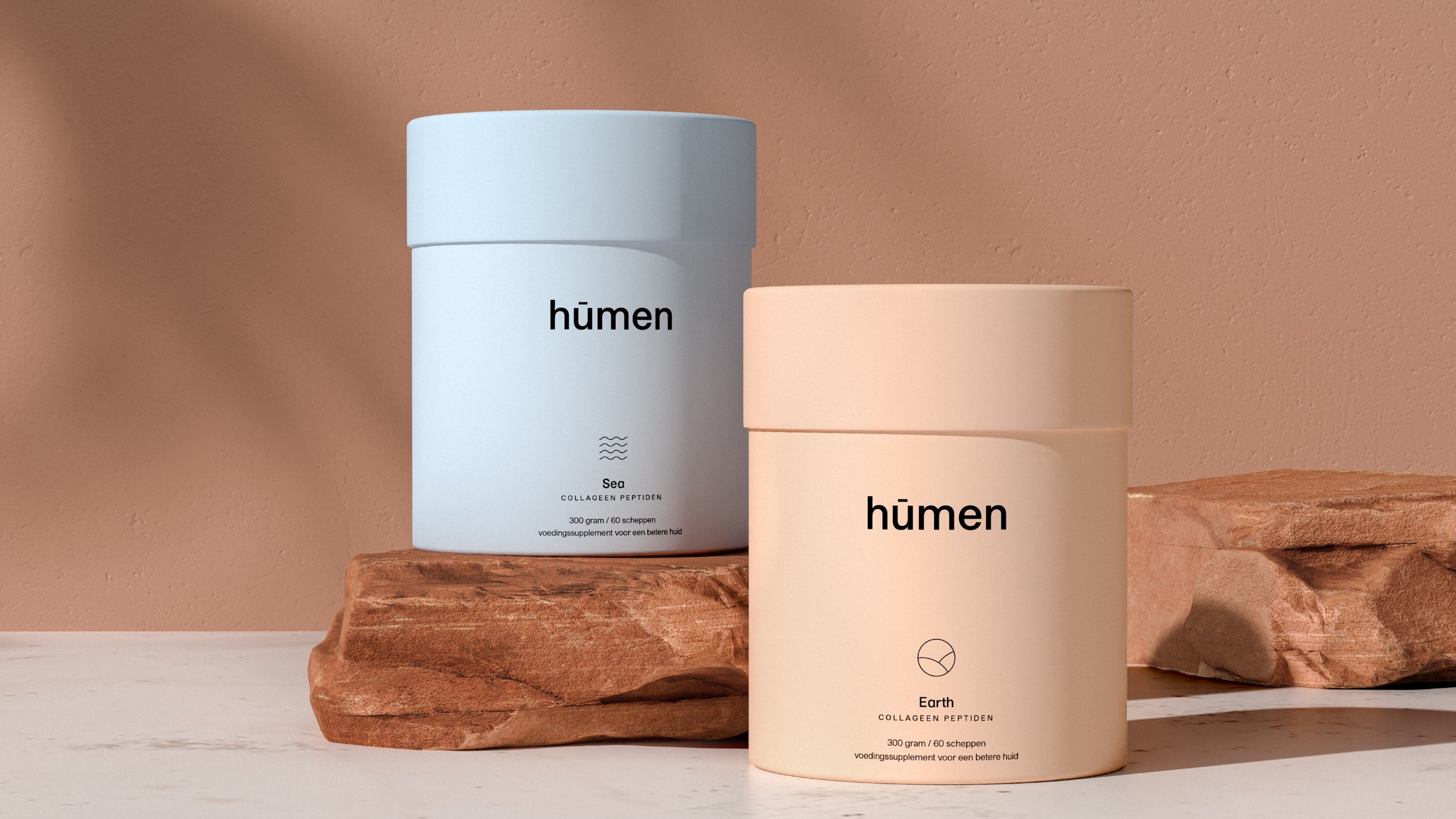Frequently Asked Questions
What is Collagen?
Collagen is an endogenous protein that holds our body together. It is part of the connective tissue in our body and is found in our skin, joints, bones, muscles and blood vessels, among other things.
Collagen ensures that the body is strengthened from the inside and that the skin structure is influenced. Collagen is produced by fibroblasts and broken down by enzymes. However, after our 25th year of life, our body deteriorates in its own production of collagen and the production of this body's own protein is almost impossible after 50 years. For this reason, it is important to promote the production of collagen and/or to reduce the breakdown of collagen. This can be done, among other things, by using collagen powder.
Why Collagen Powder?
Our body naturally produces collagen, but collagen production decreases after the age of 25. As a result, the skin can lose as much as 30 to 80% collagen over time. This can lead to a reduction of fullness in the skin and an increase in (deep) wrinkles.
Collagen proteins provide structural support to tissues and are involved in essential body processes, including tissue repair and signaling between cells.
Although important for the whole body, the collagen proteins are especially important for skin elasticity and the reduction of wrinkles.
What is Hydrolyzed Collagen?
Hydrolyzed Collagen Powder (also known as Collagen Peptides) is collagen that has then been broken down into more easily soluble amino acids for our bodies to absorb better and faster.
Hūmen collagen is hydrolyzed and 100% bioactive and is therefore well absorbed by the body.
Does collagen powder make sense?
Science tells us that collagen works.
Several studies on the benefits of collagen have shown that collagen peptides or supplements containing collagen can slow skin aging by reducing wrinkles and dryness. In addition, research shows that collagen helps strengthen hair and nails.
A promising study of 11 different clinical studies focusing on 805 women ages 30 to 50 found that taking 5 to 10 grams of collagen per day for 4 to 12 weeks led to improvements in skin elasticity and hydration. The following results are known:
- 24% more skin elasticity
- 23% better hydrated skin
- 20% stronger and more resilient skin
- 11% less wrinkles & fine lines on the face
What contains the most collagen?
There are several ways to replenish extra collagen in the body. The most important two are taking collagen supplements and adjusting your diet.
Hydrolyzed Collagen Powder
The advantage of taking a collagen supplement is that it contains large amounts of collagen that can also be better absorbed by your body. This is because it does not have to be broken down by the body first. Collagen protein powder is safe and can be taken in various forms, for example by mixing it into smoothies or dissolving it in coffee or tea after exercise. Collagen protein supplements are available as tablets, powders, and even ready-to-drink drinks, but we recommend collagen powder because this is where most of the research has been done.
Adjusting your diet | Nutrition
For the maintenance of collagen protein and the production of new collagen in the body, it is important to get enough protein, healthy fats, vitamin C, vitamin D and zinc.
To produce collagen, your body needs:
Proline : Found in egg whites, dairy, cabbage, mushrooms and asparagus.
Glycine: Found in pork skin, chicken skin and gelatin, and a variety of other protein-rich foods.
Vitamin C : Found in citrus fruits and peppers.
Zinc: Found in beef, lamb, pork, shellfish, chickpeas, lentils, beans, milk, cheese, and various nuts and seeds.
Copper: Found in organ meats, cocoa powder, cashews, sesame seeds, and lentils.
As you age, your existing collagen breaks down and it becomes harder for your body to produce more. As a result, many people turn to collagen supplements. This is an effective form of replenishing collagen in your body.
What is the daily recommended amount of collagen?
Research shows that during the build-up phase (12 weeks) it is best to take 5 to 10 grams of collagen per day for the best result. That's all it takes.
After the first 12 weeks, 5 grams is sufficient (maintenance phase).
Which collagen is the best?
The best collagen powder is a powder that is made in Europe according to the highest quality standards (ISO 9001 and FSSC 22000 production standard), is 100% bioactive and is therefore well absorbed by the body, has a neutral taste and dissolves well in cold and hot drinks .
Húmen collagen powder meets all these standards and contains only one ingredient – type 1 hydrolyzed collagen from bovine (VERISOL®) or fish (NATICOL®).
This way you can be sure that you are taking a pure collagen supplement.
What is the difference between 'Sea' & 'Earth'?
Our names for Sea & Earth relate to what the collagen is made from.
Húmen Sea collagen comes from fish, Humen Earth collagen comes from beef. Both are produced from high-quality raw materials through a mild enzymatic process.
Pescatarians or flexitarians can make the best use of our fish collagen .
Why do you use a jar and not individual sachets?
Loose sachets (often made of plastic) are not environmentally friendly. Instead of using separate sachets, we opted for a sustainable pot made from recycled material . An additional advantage is that the production of this packaging is slightly cheaper and we can therefore put more collagen in the jar. So you get more value for your money and it's also better for the environment!
How often should you use collagen?
Research shows that during the build-up phase (12 weeks) it is best to take 5 to 10 grams of collagen per day for the best result. That's all it takes.
After the first 12 weeks, 5 grams is sufficient (maintenance phase).
Does collagen have side effects?
Because collagen is a protein found in our bodies and easily digested, collagen supplements are generally well tolerated, with few known side effects.
However, collagen supplements are often made from fish, meat or shellfish. People with allergies to these foods should of course also avoid collagen powder made with these ingredients. Unfortunately, collagen does not occur in nature, people who do not want to eat meat (pescatarians or flexitarians) can best use our fish collagen .
Either way, collagen supplements appear to be safe and risk-free for most people.
What is the difference between fish collagen and bovine collagen?
Bovine collagen is mainly extracted from the hides, cartilage and bones of cattle and fish collagen is mainly extracted from the skins, bones and bones of fish. Fish and shellfish allergy is more common than a beef allergy.
In terms of effectiveness, fish and bovine collagen do not differ much. However, the most important thing to pay attention to when purchasing collagen is that you buy a hydrolyzed variant.
Is Hūmen collagen free of lactose, gluten and soy?
Sure. Hūmen collagen is made from only one ingredient - type 1 hydrolyzed collagen (from Beef) and therefore completely free of gluten, soy, lactose.
What is your delivery time?
Ordered on Monday to Friday before 2:00 PM = shipped the same day.
Do you have another question?
Do you have a question about our products, the use of collagen or health? We're here for you. You may email or call us.
Please email us at hi@humen.nl

Quick view
Fish collagen
-
Regular price
-
€49,95
-
Regular price
-
-
Sale price
-
€49,95
- Regular price
-
€49,95 - Regular price
-
- Sale price
-
€49,95
Quick view
Bovine collagen
-
Regular price
-
€49,95
-
Regular price
-
-
Sale price
-
€49,95
- Regular price
-
€49,95 - Regular price
-
- Sale price
-
€49,95


